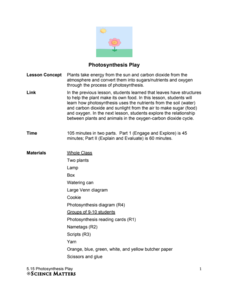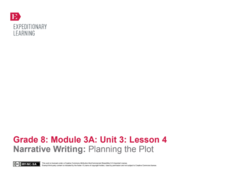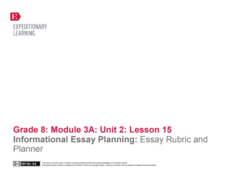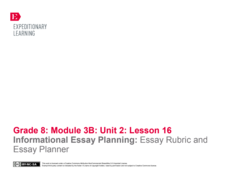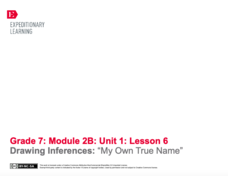State Bar of Texas
Dred Scott v. Sandford
Who decides someone is not a real person? Scholars investigate the Dred Scott v. Sandford court case which deals directly with slavery and citizenship. After viewing a short video clip, classmates work in pairs to assess and discuss the...
National Constitution Center
AP English Language—Precision of Language
Say what you mean and mean what you say. The Precision of Language addresses the importance of words, especially when they concern a person's rights. Scholars take a look at many different examples and complete questions analyzing the...
Smithsonian Institution
Comparing Confederate and Union Soldiers
The Civil War, a war that divided a nation. Comparing and contrasting the Confederate and Union soldiers is not always an easy task, but the eighth of 15 resources makes it easy to teach the concepts. Exercises include watching videos in...
Ford's Theatre
Not Just Stone and Metal: Memory and Monuments Today
Should we remove historical Confederate monuments? Teach scholars both sides to the story using a resource that includes a class discussion, reading materials from two prominent figures on both sides of the argument, and an assessment...
Pace University
Urban Communities
Urban communities are the focus of a series of lessons created to meet specific needs using differentiated instruction. A pre-assessment designates scholars into three groups based on their ability level. Small groups take part in...
Science Matters
Photosynthesis Play
Photosynthesis seems nothing short of magic: a little carbon dioxide and water, add energy, and poof, you get food! A thorough, collaborative lesson teaches youth the process of photosynthesis thanks to a skit they perform with a group...
Purdue University
Light – Just Right!
What does it mean to be resistant to electricity? Scholars answer the question in a six-part STEM instructional activity on electricity. They begin by assessing the conductivity of several different materials and progress to designing...
PBS
The Supreme Court: Civil Rights and Civil Liberties
While World War II changed the international order, it also led to a fundamental shift in the concept of civil rights within the United States. Using a video and discussion questions, class members consider the effects the war had to the...
PBS
Latino Americans Share Their Experiences
Three Latino Americans are the focus of an interactive that spotlights their accomplishments. Scholars get to know Lin-Manuel Miranda, Judy Reyes, and José Hernández through short informative text and videos. Participants read, take...
Kentucky Department of Education
Number Operations in Base Ten: Division and Interpreting Remainders
What do I do with what is left over? The formative assessment activity lets individuals show what they understand about remainders in multi-digit division problems. Teams work together to match drawings with division problems before...
EngageNY
Grade 10 ELA Module 3: Unit 3, Lesson 11
It's time to show what you know. Scholars finalize their argumentative essays by making last-minute revisions to conventions, tone, and formal style. Learners review the checklist to ensure they have met all the task requirements. They...
EngageNY
Connecting the Universal Refugee Experience of Fleeing and Finding Home to the Title of the Novel Inside Out & Back Again
What does it mean to turn inside out? Using the resource, scholars begin planning their end-of-unit assessment essays. They complete two graphic organizers to form claims about how refugees turn "inside out" and "back again."
EngageNY
Building Background Knowledge: Vietnam as a “Battleground in a Larger Struggle”
Read. Stop. Think. Scholars use a reading strategy to process the challenging text, "The Vietnam Wars." They read a paragraph and then stop to think about the text and its meaning. Readers then go on to work with partners and make notes...
EngageNY
Comparing Meaning and Tone: The Fall of Saigon in Fiction and Informational Text
Who's that talking to? Readers listen to a reading of the "Forgotten Ship" transcript and answer questions focusing on word meaning and choice. They complete a chart to track the multiple narrators in the script. For homework, readers...
EngageNY
Narrative Writing: Planning the Plot
You will never forget that moment. Scholars read a model narrative and analyze the moment a character became visible again. They compare the narrative to Okubo in Unbroken. Readers also assess the narrative essay according to a rubric...
National Wildlife Federation
Pollinator's Journey: Grades K-4
Mimic the struggle of migratory pollinators. Pupils learn about the threats to pollinator species. They go on to enact a play demonstrating the hazards migratory pollinators experience. To finish, individuals complete a chosen assessment...
EngageNY
Analyzing Evidence: Writing about Theme
Class members prepare for the end-of-unit assessment by analyzing a writing prompt. They complete a Being Made Invisible anchor chart and write their thoughts about captives and invisibility on sticky notes. In addition, they discuss...
EngageNY
Informational Essay Planning: Essay Rubric and Planner
Pupils walk through the process of writing essays for their final assessment of Unbroken. They begin by reviewing the rubric using Rubric Criteria strips that assign a portion of the rubric to each pair of learners. They then participate...
American Battlefield Trust
Civil War Play
Everyone has a role to play. Young scholars step into history by taking on the roles of soldiers—both male and female—during the Civil War using a fictionalized play of what life was like on the battlefield. Pupils also examine the roles...
Minnesota Department of Natural Resoures
Getting to Know Trees
Celebrate the beauty of trees with a packet full of activities designed to help kindergarteners get to know about their leafy nature friends. Covering a variety of subjects, scholars go on a nature hike, read Shel Silverstein's The...
Minnesota Department of Natural Resoures
Parts of a Tree
Discover the parts of a tree and so much more with a packet of activities covering a range of subjects. First graders label practice pages, test their measuring and addition skills, explore books, dance, build 3-D trees, play games, give...
EngageNY
Informational Essay Planning: Essay Rubric and Essay Planner
Class members dig into the expectations for the end-of-unit assessment for A Mighty Long Way by studying the rubric. The Rubric Criteria strips help pairs of readers look more closely at specific rubric points. They share ideas with the...
EngageNY
Analyzing Text Structure: “Generation Z Stereotyped”
Breaking the stereotype. Readers use the Generation Z Stereotyped Structure anchor chart and find the central idea of the text. They then read Generation Z with partners and discuss the text using guiding questions. Finally, they answer...
EngageNY
Drawing Inferences: “My Own True Name”sl.7.1
How much are you worth? Scholars read text dependent questions, and discuss how the text relates to self worth. They then work with partners by having written conversation to make inferences about the text. For homework, pupils correct...
Other popular searches
- Standards and Assessment
- Special Education Assessment
- Place Value Assessment
- Math Assessment
- Fitness Assessment
- Assessment Rubrics
- Self Assessment
- Assessment Tools
- Assessment Volleyball
- Math Assessment on Coins
- Reading Assessment
- Dance Assessment







